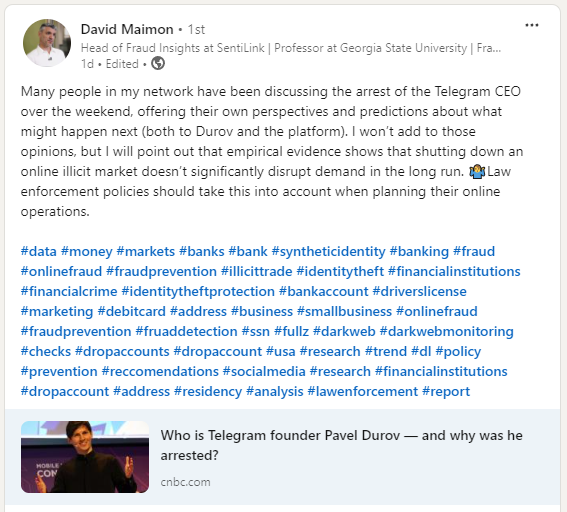Arrest of Telegram CEO Pavel Durov Will NOT Deter Fraudsters
The internet is buzzing this morning with news that Telegram CEO Pavel Durov was arrested in Paris.
According to APNews:
Durov was detained in France as part of a judicial inquiry opened last month involving 12 alleged criminal violations, according to the Paris prosecutor’s office. It said the suspected violations include complicity in selling child sexual abuse material and in drug trafficking, fraud, abetting organized crime transactions and refusing to share information or documents with investigators when required by law.

As many of us are painfully aware, Telegram is a major communication channel and marketplace for fraudsters -- a particularly popular channel for check fraud. Telegram provides an easy-to-access marketplace for fraud tools; in fact, Telegram's reputation as a "one-stop shop" for fraudsters has made it notorious enough to get a label of its own.
Why Fraudsters Love Telegram
Telegram's appeal to threat actors is due to its anonymity, user-friendliness, and ability to connect with victims globally. "Channels" and "rooms" can be set up almost instantly. If threat actors believe a channel has been infiltrated, it can be deleted and replaced in minutes.
An article from Flare explains how fraudsters benefit from Telegram's ability to communicate internationally, its anonymity, user-friendly platform, and the ability to connect fraudsters with consumers directly.
This is why fraudsters are leveraging Telegram for check fraud: They are able to sell stolen checks, check fraud services, and "cooking labs," as well as share information -- because of its encryption and anonymity.

ABOVE: Sample Telegram ad
How Will Durov's Arrest Affect Telegram and Fraudsters?
It remains to be seen what will happen with Telegram. There are several top-of-mind questions for #FraudFighters, including:
- Will Telegram increase its moderation of content?
- Will Telegram start cooperating with law enforcement investigations?
- Or - will this be the downfall of Telegram itself?
One thing that should be noted is that if any of the above occur, there will be a new communication channel moving into its vacant space. Fraudsters are not easily deterred and will adapt quickly.
While we can agree that an increase in moderation and cooperation with law enforcement would make Telegram less ideal for fraudsters, financial institutions cannot make the mistake thinking this will slow down fraudsters for more than a moment.
As noted by David Maimon on LinkedIn:

Financial institutions should continue to invest in technologies like behavioral analytics, image forensic AI, consortium data, and dark web monitoring. The only way to deter exploitation of checks is for fraudsters to continue to be unsuccessful.